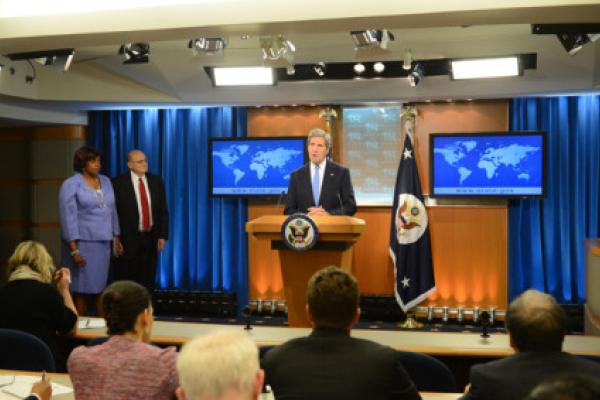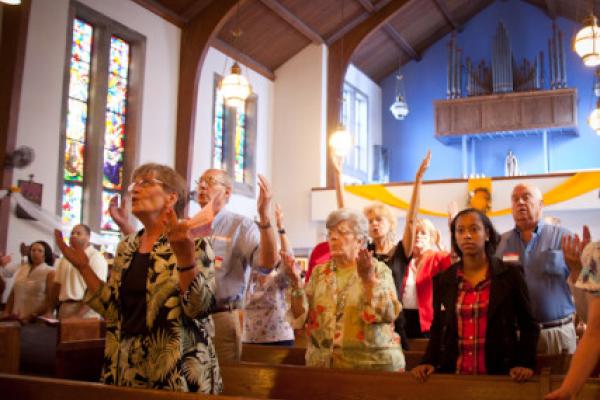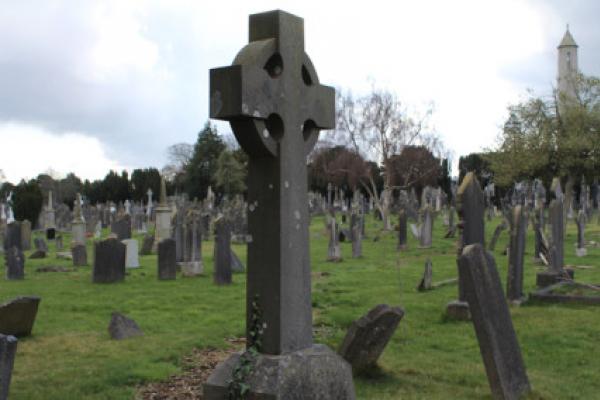President Barack Obama will deliver a major speech on drone policy tomorrow. And for a number of reasons—including a smaller number of important al Qaeda targets, issues such as bad weather to diplomatic problems, and concerns about the costs and benefits—the number of drone strikes being carried out is dropping. The New York Times reports:
But lost in the contentious debate over the legality, morality and effectiveness of a novel weapon is the fact that the number of strikes has actually been in decline. Strikes in Pakistan peaked in 2010 and have fallen sharply since then; their pace in Yemen has slowed to half of last year’s rate; and no strike has been reported in Somalia for more than a year.
In a long-awaited address on Thursday at the National Defense University, Mr. Obama will make his most ambitious attempt to date to lay out his justification for the strikes and what they have achieved. He may follow up on public promises, including one he made in his State of the Union speech in February to define a “legal architecture” for choosing targets, possibly shifting more strikes from the C.I.A. to the military; explain how he believes that presidents should be “reined in” in their exercise of lethal power; and take steps to make a program veiled in secrecy more transparent.
Read more here.
In a letter sent to the White House and the leadership of key Congressional committees, Bishop Richard E. Pates of Des Moines, Iowa, chair of the U.S. Catholic Bishops’ Committee on International Justice and Peace, wrote that the use of drones in counter-terrorism “raises serious moral questions.”
Even when viewed through the prism of just war principles, the use of unmanned aerial vehicles (UAVs) for targeted killings raises serious moral questions. The Administration seems to have focused narrowly on the just cause of protecting citizens, but other elements of the tradition pose significant questions, including discrimination, imminence of the threat, proportionality and probability of success. Targeted killing should, by definition, be highly discriminatory. The Administration's policy appears to extend the use of deadly force to alleged "signature" attacks and reportedly classifies all males of a certain age as combatants. Are these policies morally defensible? They seem to violate the law of war, international human rights law, and moral norms.
He concludes by asking:
We understand the necessity for operational secrecy in counter-terrorism, but isn’t it critical to have a public discussion of the terms of the Administration’s policy of employing drones for targeted killings? Don’t the moral and strategic issues involved require broader discussion? Shouldn’t a policy with such wide potential consequences be subject to public scrutiny, at a minimum by representative institutions in a democratic society?
Read more here.
Where there is hope, there is future.
Today is Hunger Action Day.
For many in my beloved Golden State, today will go unnoticed. It will be what it always is — a Wednesday full of its special nuances with perhaps homework, meals and snacks, pleasant weather, and most definitely, a dose of stressful traffic. It will be normal. Life will be as it always is. For others however, myself included, this is the day we have been waiting for. In fact, you could even say, that this is the day we’ve been hungry for.
More than 300 California residents from all around the state — from the beach towns to the gritty parts of the city — have committed their day, their energy, and their hearts to visiting with their representatives to advocate for their neighbors and friends who every day face hunger. To these few hundred residents who have taken the time to journey to Sacramento, the opportunities that today provide could be life changing for thousands.
The Obama administration isn’t afraid to call out Republicans for playing politics on Capitol Hill, or Wall Street for runaway profits or insurance companies for health care woes.
But why, when it comes to protecting religious freedom abroad, is the State Department so hesitant to name names?
Watchdogs say the State Department missed a key opportunity to put teeth into its annual assessment of global religious freedom, which was released by Secretary of State John Kerry Monday.
Continuing a pattern begun under President George W. Bush, the report does not include a list of “countries of particular concern,” or “CPCs” — the diplomatic term for countries that either actively suppress religious freedom or don’t do enough to protect it.
Nothing upsets the folks in the pews as much as changing the liturgy that they’re accustomed to, and that seemed likely to be the case when the Vatican ordered revisions to the familiar prayers and rubrics of the Catholic Mass.
But now, more than a year after the changes took effect in U.S. parishes, a survey of American priests shows that they are more disturbed by the innovations than their flocks.
In fact, the poll, conducted by researchers at St. John’s University School of Theology-Seminary in Collegeville, Minn., showed that almost 60 percent of priests surveyed did not like the new Roman Missal, as the liturgical book for the Mass is known, while about 40 percent approve.
DUBLIN — Patricia Wojnar left a 32-year career in interior design to pursue a degree that wasn’t in demand: a master’s in bereavement studies.
Having seen four family members die early, she wanted to understand how to adapt.
As it turned out, the degree perfectly prepared her to enter one of Ireland’s emerging professions.
Wojnar is now a registered civil celebrant, presiding over funerals and weddings for people who refuse to associate with Ireland’s scandal-tarred Roman Catholic Church. She’s not alone; many newly minted civil celebrants are starting their own businesses as part of Ireland’s “post-Catholic” economy.
Although many observers have noted the impact of secularization and child abuse scandals on church membership and finances, only now are the Irish seeing the cultural and socioeconomic reverberations. These include a class of people willing to observe life’s most significant milestones outside the church.
Religious historians say that every 500 years, Christianity goes through a “massive transition,” as noted religion writer Phyllis Tickle puts it.
Around 500 A.D., “barbarians” sought to subjugate Rome by wiping out its underlying religion. Christianity went underground. In abbeys like Iona, monks painstakingly copied Scripture and civilization’s great writings, in effect saving Western civilization itself.
Around 1000 A.D. came the “Great Schism,” when the Western church based in Rome and the Eastern church based in Constantinople fought over creeds and doctrine, political power and cultural hegemony. That split endures to this day between Eastern Orthodoxy and Catholicism.
Around 1500 A.D. came the Protestant Reformation, when nationalism born of exploration in the New World and new commercial wealth demanded an end to Rome’s domination of European life. That split, too, endures.
Now comes a new millennium, and Christianity wears so many different faces that it’s difficult to speak of a single “Christian movement.”
Wearing a bright orange prison jumpsuit, the priest at the center of the furor in the Archdiocese in Newark made his first court appearance on Tuesday on charges he violated a court-sanctioned lifetime ban on working with children.
The Rev. Michael Fugee, 52, stood for the brief hearing as Bergen County Assistant Prosecutor Demetra Maurice read the seven counts against him.
Maurice is the same prosecutor who authored the 2007 agreement with Fugee and the Archdiocese of Newark that bars him from working with children in any capacity as long as he remains a priest.
What the heck is going on in Syria? If you are like me, you have a problem keeping all the players straight, and the unfamiliar Arab names don’t help. Thankfully, the Syrian president has a relatively easy name to remember, Bashar al-Assad, but keeping track of who’s who and which side they’re on is a real challenge. Frankly, even when I can keep track, I’m very skeptical that I am getting anything close to the truth from news outlets, the White House, or our State Department. The talk about a “red line,” no-fly zones, arming terrorists, and weapons of mass destruction sounds a lot like the falderal we were being fed going into the Iraq war. So what’s a good citizen of the world to do? If I can’t make sense of the news accounts myself, who can I find to help me out? And if I can’t trust my government to sort out the good guys from the bad guys for me, how can I ever figure out what, if anything, my government should be doing in my name?
It’s a hard truth that, in the real world, Goliath sometimes beats David.
In the July issue of Sojourners, I wrote about the battle to save the Anna Louise Inn and how Cincinnati’s faith community has come together for the fight. Run by Cincinnati Union Bethel, a small non-profit, the Inn has provided safe and affordable housing for women in the city for 104 years and is one of Cincinnati’s most revered institutions.
But last Monday, Cincinnati Union Bethel announced it was selling the Anna Louise Inn to Western and & Southern Financial Group after a two-year legal battle.
“The needed resources, time and energy to this litigation has diverted focus from our other successful programs,” they wrote on their website. “This settlement and purchase agreement allow us to dedicate ourselves to our mission of serving women and children.”
Cincinnati Union Bethel owns both the Inn and the land on which it sits, but Western & Southern – a Fortune 500 company located across the street – wanted the property to build high-end real estate. So, when Cincinnati Union Bethel received $13 million in federal tax credits to renovate the Inn, Western & Southern sued them and the city of Cincinnati.








